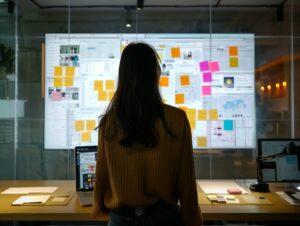
In the age of digital transformation, the role of librarians is changing significantly. We are no longer merely custodians of books but are becoming guides in the world of information. In this rapidly evolving environment, where information spreads faster than ever, the ability to critically evaluate the reliability and quality of online sources is essential for both us and our users.
Critical thinking when evaluating online sources does not simply mean doubting every piece of information, but rather approaching the assessment of information systematically. This includes actively verifying sources, analyzing content, and determining whether the information is accurate, relevant, and unbiased.
Why is critical thinking important? In an era where misinformation spreads at incredible speed, critical thinking is essential for maintaining trust in information. As librarians, we have a responsibility to help users develop critical thinking skills so they can successfully navigate the flood of information and distinguish fact from fiction.
When critically evaluating the reliability and quality of a website, it is important to consider several factors that can influence your trust in the information provided. Here are some key factors to keep in mind:
1. Authorship: Check who is the author of the content on the website. Is the author an expert in their field? Do they have the appropriate education or experience? On the internet, anyone can present themselves as an expert, so it is important to verify the author’s background and credibility.
2. Content and Language: Analyze the content on the website. Is it well-researched, objective, and supported by sources? Is the language clear and precise? Pay attention to potential errors, emotional language, or bias, which may indicate that the content has been machine-translated or machine-generated and may not be reliable.
3. Sources and Referencing: Check whether the website cites its sources. Are the news or information reported by other sources as well? Are the sources used by the website credible and reliable? Trustworthy websites usually provide their sources and allow access to the original information.
4. Publication Date: Check when the content was published or last updated. Information can change over time, so it is important to use the most recent and up-to-date data.
5. Purpose of the Website: Try to determine the purpose of the website. Is it informational, commercial, propagandistic, or entertainment-focused? Understanding the website’s purpose can help you assess potential bias or hidden motives behind the presentation of certain information.
6. Design and Functionality: Reliable websites are usually well-designed and easy to navigate. Sites that are poorly designed, filled with advertisements, or contain non-functional links may indicate a lack of professionalism and reliability.
7. Domain and URL: Check the website’s domain. Domains ending in “.edu,” “.gov,” or “.org” are often more reliable, as they typically belong to educational institutions, government organizations, or non-profit organizations. However, exceptions exist, so caution is still advised.
8. Feedback and Reviews: Look for feedback or reviews from other users about the website. This can help you gain additional perspective on the site’s reliability and quality. Verify news on fact-checking platforms such as:
- NO/YES Myth-Buster – Portal of the Slovenian Press Agency
- Debunking
- The Adria Digital Media Observatory (ADMO) is a Croatian-Slovenian hub for combating disinformation.
- EUvsDisinfo
- The European Digital Media Observatory (EDMO) is an observatory that brings together fact-checkers, academics, and other relevant stakeholders for mutual collaboration. It encourages them to actively engage with media organizations and media literacy experts, and to provide support to policymakers. This helps coordinate efforts in the fight against disinformation.
Projects funded as part of efforts to combat disinformation are often supported by European, national, or international institutions and organizations that aim to strengthen media literacy, raise awareness about disinformation, and improve fact-checking.
Source:
https://www.gov.si/zbirke/projekti-in-programi/dezinformacije/
https://commission.europa.eu/strategy-and-policy/coronavirus-response/fighting-disinformation/funded-projects-fight-against-disinformation_sl
European Commission, Directorate-General for Education, Youth, Sport and Culture, (2022). Guidelines for teachers and educators on tackling disinformation and promoting digital literacy through education and training, Publications Office of the European Union. https://data.europa.eu/doi/10.2766/28248
